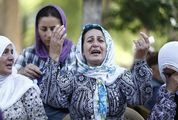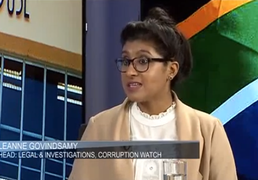Little has changed in Marikana since massacre
by Sipho Mabena
2016-08-20 20:16:18.0
STANDING on top of Wonderkop hill‚ on the boulders of death‚ looking down at Nkaneng informal settlement‚ all that greets the eye is a plain sprawling with shacks.
This vantage point marks the spot where some of the 34 miners killed by police in what has become known as the worst police action since Sharpeville perished in a hail of bullets on August 16‚ 2012.
The miners‚ many of them living in this Marikana slum for years‚ took a stand on this koppie to fight for a basic salary of R12‚500. This is where children play barefoot in muddy puddles in the dirt road as jobless youths compete for shade with goats‚ with some brewing sorghum beer to get by — their hopes of a better life than back home in the Eastern Cape dashed.
READ THIS: Politics are shifting, but ANC is still a powerful force
The only sign of electricity is power lines hovering over the settlement taking electricity to the smelter. In parts of the settlement‚ water is a luxury.
In one of the maze of shacks‚ Bab’Ndlela‚ not his real name‚ a tall man with wondering eyes‚ is washing his overalls in a metal basin propped up by a wooden bench.
The 57-year-old father of four from Ladysmith‚ KwaZulu-Natal‚ has been crushing ore at the Lonmin smelter conspicuous on the outskirts of this settlement for almost 30 years.
He sends most of the R8‚000 monthly salary back home. "We do not live here‚ in this way‚ because we like it. We have families depending on us‚" he says‚ squeezing foam from his hands. Four years since his comrades were massacred‚ he says their blood was spilled in vain as nothing has changed.
Hazel Msiya‚35‚ a mother of two from Flagstaff in the Eastern Cape‚ supplements her rock driller husband’s salary by brewing sorghum beer‚ which she sells for R10 a litre.
"I came here in (the year) 2000 to be with my husband‚ hoping to find a job but I have found myself having to survive by selling sorghum beer. I am a hairdresser by trade but poverty in this area is such that people can hardly afford to do their hair‚" she said.
There is however hope for 19-year-old Soga Mfesane from Libode who arrived here two years ago and has not worked ever since.
The second phase of the construction of low cost housing for miners is about to start in nearby Karee mine and there is a promise of jobs there.
"We have submitted our copies and identity documents and now we are holding breaths for our names to be amongst the lucky ones. Back home they are pinning their hopes on us finding jobs here‚" he said.
A lone cross at the bottom of the koppie is a scant reminder of the bloodbath that ensued in August 2012 when police moved in to disperse the crowd of miners who had gathered there to make their stand for higher wages.
On March 21‚1960‚ black South Africans marching to a local police station in Sharpeville in the Vaal Triangle to protest against pass laws met with a similar fate when police opened fire on the crowd‚ killing 69.
TMG Digital
MEMORIAL: Crosses planted on the koppie near the Nkaneng informal settlement in Marikana where 34 miners lost their lives at the hands of police during a protest in August 2012. Picture: THE TIMES
STANDING on top of Wonderkop hill‚ on the boulders of death‚ looking down at Nkaneng informal settlement‚ all that greets the eye is a plain sprawling with shacks.
This vantage point marks the spot where some of the 34 miners killed by police in what has become known as the worst police action since Sharpeville perished in a hail of bullets on August 16‚ 2012.
The miners‚ many of them living in this Marikana slum for years‚ took a stand on this koppie to fight for a basic salary of R12‚500. This is where children play barefoot in muddy puddles in the dirt road as jobless youths compete for shade with goats‚ with some brewing sorghum beer to get by — their hopes of a better life than back home in the Eastern Cape dashed.
READ THIS: Politics are shifting, but ANC is still a powerful force
The only sign of electricity is power lines hovering over the settlement taking electricity to the smelter. In parts of the settlement‚ water is a luxury.
In one of the maze of shacks‚ Bab’Ndlela‚ not his real name‚ a tall man with wondering eyes‚ is washing his overalls in a metal basin propped up by a wooden bench.
The 57-year-old father of four from Ladysmith‚ KwaZulu-Natal‚ has been crushing ore at the Lonmin smelter conspicuous on the outskirts of this settlement for almost 30 years.
He sends most of the R8‚000 monthly salary back home. "We do not live here‚ in this way‚ because we like it. We have families depending on us‚" he says‚ squeezing foam from his hands. Four years since his comrades were massacred‚ he says their blood was spilled in vain as nothing has changed.
Hazel Msiya‚35‚ a mother of two from Flagstaff in the Eastern Cape‚ supplements her rock driller husband’s salary by brewing sorghum beer‚ which she sells for R10 a litre.
"I came here in (the year) 2000 to be with my husband‚ hoping to find a job but I have found myself having to survive by selling sorghum beer. I am a hairdresser by trade but poverty in this area is such that people can hardly afford to do their hair‚" she said.
There is however hope for 19-year-old Soga Mfesane from Libode who arrived here two years ago and has not worked ever since.
The second phase of the construction of low cost housing for miners is about to start in nearby Karee mine and there is a promise of jobs there.
"We have submitted our copies and identity documents and now we are holding breaths for our names to be amongst the lucky ones. Back home they are pinning their hopes on us finding jobs here‚" he said.
A lone cross at the bottom of the koppie is a scant reminder of the bloodbath that ensued in August 2012 when police moved in to disperse the crowd of miners who had gathered there to make their stand for higher wages.
On March 21‚1960‚ black South Africans marching to a local police station in Sharpeville in the Vaal Triangle to protest against pass laws met with a similar fate when police opened fire on the crowd‚ killing 69.
TMG Digital






















